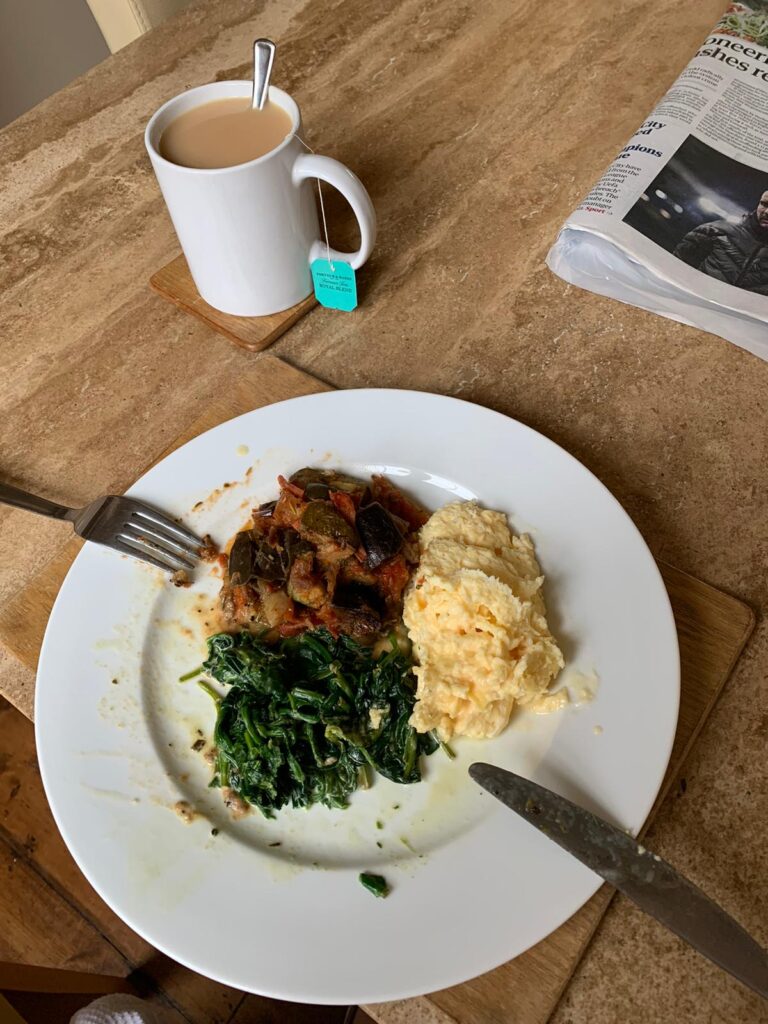 Reading Time: 6 minutes
Reading Time: 6 minutesBy Faye
It’s mid February and we are well into the new year, maybe you took the opportunity to make a fresh start and have set some resolutions or goals? Many people will have been attempting to make changes to their health habits and routines, maybe going “on“ a diet, giving things up, following a new exercise plan or following popular trends such as veganism or dry January.
If you are one of those people, how is it going? Have you maintained your plan so far? Does it feel easy? Or have there been challenging days?
If you have implemented some changes, we are interested to know about how you have made your decisions and choices about what you will do? How do you know what food and eating habits are right for you?
How can you distinguish what your body really needs to lose weight and gain health from what your brain, beliefs, emotions and ingrained habits push you towards?
We ask these questions because we think they are important points, there are millions of diets out there and plenty of conflicting views about what constitutes a healthy diet and a healthy way of eating for weight loss. Speaking to new clients this month we have noticed a very distinct theme, and that is, that many people are not really clear on what to do, and how to do it. This is perhaps one of the reasons why so many people fail and give up new year resolutions before the second month is even out.
A common theme among the people we talked to was that they were still attempting to lose weight with a low fat, calorie counting approach. This seemed to focus the mind on counting, measuring, guilt, deprivation and the brain on cravings and food.
Could it be that it’s not even about willpower or commitment, it’s about getting the right strategy (one that works) and willingness to change and take a different perspective when it doesn’t?
“Weight loss is not about willpower, it’s about getting the right strategy (one that works) and willingness to change”.
If you choose to work with us, one of our goals at WIM is to help you create a strategy that is behaviourally sustainable, tailored to your bio-individuality, becomes part of who you are and fits into your life in the longer term.
We view weight loss first as a psychological process (then later a physical process). The first step being in your mind, when you begin to contemplate change. So we also focus on helping you create a calm and focused mindset and an enjoyable process, (yes enjoyable!). If a behavioural strategy is enjoyable, flexible and do-able isn’t it much more likely to be maintained?
One of the points we make again and again during our courses is that humans tend to make decisions based on their beliefs. What we believe about a situation tends to drive our behaviour. So, for example, if we believe that a low fat diet is the way to lose weight we might implement that behaviour.
We get our beliefs from a variety of sources, (the media, our society and culture, friends family, education and experiences) and they are not necessarily true! These sources are rarely about what is appropriate for us as individuals. Government guidelines are based on general population figures. Mainstream diet clubs tend to offer their same programme to everyone. The food industry is motivated by profit before health. Our friends and family may have our best interests at heart but how will any of these sources know what it is you as an individual need to do, think, change in order to achieve your goals?
So if you are going to go to some effort and put some significant time energy and money into making behaviour changes happen then we recommend that you choose your changes wisely and make them informed choices that work. Working alongside us can help to make weight loss and health creation energising empowering and effective.
Here is what one client said about her experience of working with us this past month.
We helped her create a new “way” of eating, reframe her beliefs about what constitutes a healthy diet and eating routine for her, based on her individual needs, symptoms and goals. She trusted us and showed a willingness to change and try something new.
Week 1
“Wonderfully liberating not to be thinking about food all the time”
Week 2
“I feel great! Felt bit hungry this morning as I’ve actually been having quite long fasts. Stomach definitely shrinking but I don’t feel weak with it, in fact very much alive and energy levels increased which is a bonus as they were quite high before. Stools regular (sorry) with no IBS for about 7 days and today stools sank! I’m absorbing my fat! I’m still able to go to the gym and do a workout, I just now have to introduce variety to my eating hours but generally don’t feel hungry and when I do eat (always good stuff) I feel satisfied. Literally cannot believe how less internally heavy I feel – it’s like I’m having a spring clean of my digestive system!
Week 3
“It’s going great, my jeans are looser, I have started to notice my body changing, feeling flatter and leaner in my stomach and hip area. I am loving the gym, I really can’t believe it, my body is doing things it has never done before. I can’t wait for the coming weeks.”
Week 4
“I am not using scales but I put on an old skirt this week and it was really loose so I know I am changing. I can’t tell you how much I am enjoying the intermittent overnight fasting approach, I just want to do more. I could never imagine that losing weight could be so enjoyable, I am just actually loving eating well, no cravings, no fuss.”

Getting Professional Support For Weight Loss & Optimum Health
If we need legal advice we might see a lawyer, if we need to fix our car we probably go to a mechanic, if we need to build a house we will likely consult an architect and surveyor, if we are seriously ill we go to a doctor but who advises you on weight loss and on your personalised health needs?
Who advises you on:
- What nutrition is optimum for you?
- What exercise may help reduce symptoms and increase weight loss?
- How to create a new strategy for how to eat?
- What you can do or not do with your thoughts, imagination and emotions to create the behaviour that will lead to better health and weight?
- What you can do to motivate yourself to make change happen?
- How, when and what to eat?
A person may put together a plan from what they know or have heard about from their childhood, from complementary and mainstream health care providers, from their peers, from advertising, from their own research or knowledge but not many people have their own personal nutritionist and health coach to guide them along.
Reconnecting With Your Body
Another trend we notice a lot in our clients is that different people seem to have more or less awareness and connection with their physical body. We seem to spend a lot of time in our heads, using our minds to think, plot and plan. Sometimes it is good to take time to consciously reconnect with our physical body, listen to signals and feelings and observe what they may mean, remind ourselves that the body talks.
We also observe that different people have different mental relationships with themselves and their bodies. Do you look in the mirror and scrutinise yourself or compliment yourself? Do you enjoy using your body in exercise, dance, in any physical activity or not? Do you pay much attention to nurturing your body? When you eat or drink anything do you think directly about the impact of that substance inside your body? How will it feel, what reactions will take place, what nourishment might you get from it or what detriment may it do? What are your repeated thoughts about your body? How useful or kind is your internal dialogue about your body?
In our client story above, each week she received a mini coaching call where she had the opportunity to ask practical questions about what she was doing and we worked together to ensure she had tools to generate thinking patterns that were motivational positive and kind.
If you are looking for more than new year’s resolutions that may fizzle out in February, If you want your resolutions to have momentum and last the year then we suggest:
- Finding out what is the right strategy for YOU, using your own intuition along with some professional advice.
- Reconnecting with your body and hunger signals.
- Question your beliefs and internal dialogue around food, eating and your body.
In our courses and clinic sessions we help you reconnect with eating patterns that are logical and intuitive and based on your genetic and biological individuality so you can start to enjoy healthy, easy weight loss.
Want to know more about what we do? Get in touch with your questions.
Interested in becoming a client? Book your free 15-minute introductory consultation and we’ll talk to you through our services.







